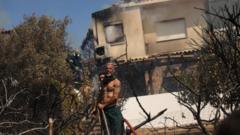The summer of 2023 has brought unparalleled wildfire conditions to Greece, with the coastal towns of Palaia Fokaia and Thymari suffering significant damage from a large fire fueled by extreme heat and strong winds. The inferno, which began in low-lying vegetation, rapidly engulfed residential neighborhoods, leading to the destruction of at least 20 homes and leaving many others partially damaged.
In response to the urgent situation, emergency alerts were issued via Greece’s 112 system, urging residents in affected towns to evacuate quickly. The local fire services have been supplemented by around 18,000 firefighters and volunteers, reflecting a heightened state of preparedness as Greece grapples with worsening wildfire conditions due to prolonged heatwaves and climate change.
Communities responded courageously, with residents collaboratively engaging in firefighting efforts alongside firefighters, forest rangers, and even coast guard members to protect homes from advancing flames. While many heeded evacuation orders, some residents chose to stay behind, armed only with garden hoses—a decision that threatened their safety and obstructed professional emergency efforts.
Desperate scenes unfolded, including the heroic rescue of at least 40 individuals, including children and elderly residents trapped by the rapid spread of fire. Eleven tourists stranded on a beach were also rescued, demonstrating the extensive reach of the fire's devastation.
Local officials, such as Babis Galanis, the deputy mayor of Thymari, have declared the situation “extremely difficult,” urging those in need of shelter or medical assistance to take refuge in municipal facilities. In light of the destruction, the head of Greece’s fire service has dispatched a special unit to investigate the cause of the fire, considering the possibility of arson.
Meanwhile, forecasts suggest that dangerously high temperatures will persist, which poses an increased risk for additional wildfires in regions such as Attica, Evia, the Peloponnese, and the northern Aegean. The ongoing battle against the blazes continues as communities rally together in a fight for survival.
In response to the urgent situation, emergency alerts were issued via Greece’s 112 system, urging residents in affected towns to evacuate quickly. The local fire services have been supplemented by around 18,000 firefighters and volunteers, reflecting a heightened state of preparedness as Greece grapples with worsening wildfire conditions due to prolonged heatwaves and climate change.
Communities responded courageously, with residents collaboratively engaging in firefighting efforts alongside firefighters, forest rangers, and even coast guard members to protect homes from advancing flames. While many heeded evacuation orders, some residents chose to stay behind, armed only with garden hoses—a decision that threatened their safety and obstructed professional emergency efforts.
Desperate scenes unfolded, including the heroic rescue of at least 40 individuals, including children and elderly residents trapped by the rapid spread of fire. Eleven tourists stranded on a beach were also rescued, demonstrating the extensive reach of the fire's devastation.
Local officials, such as Babis Galanis, the deputy mayor of Thymari, have declared the situation “extremely difficult,” urging those in need of shelter or medical assistance to take refuge in municipal facilities. In light of the destruction, the head of Greece’s fire service has dispatched a special unit to investigate the cause of the fire, considering the possibility of arson.
Meanwhile, forecasts suggest that dangerously high temperatures will persist, which poses an increased risk for additional wildfires in regions such as Attica, Evia, the Peloponnese, and the northern Aegean. The ongoing battle against the blazes continues as communities rally together in a fight for survival.





















